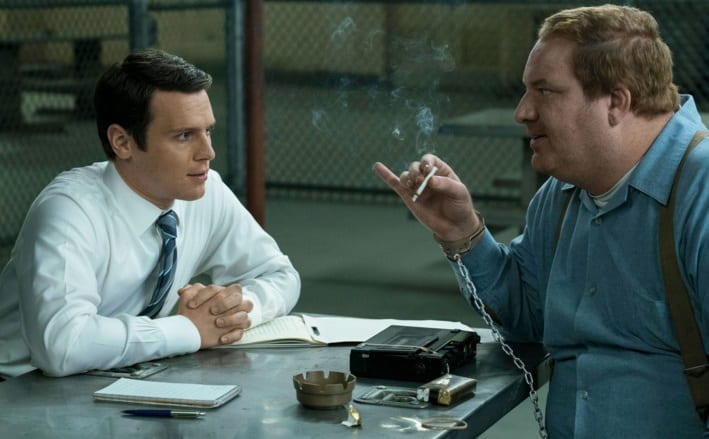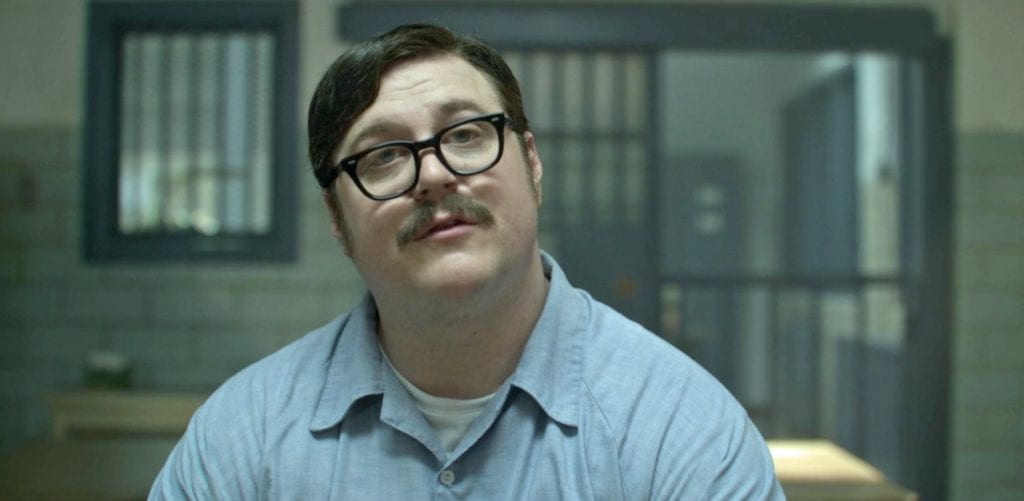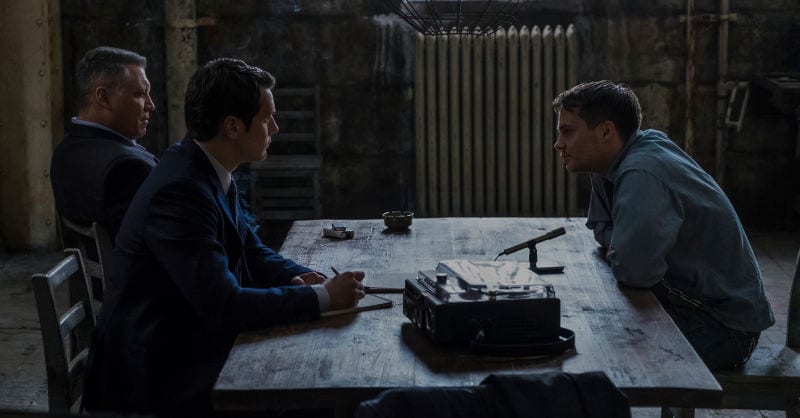There are not nearly as many articles about Mindhunter on here as there should be, so I’m going to start. Mindhunter is a Netflix original series that came out in October. The show relates the early days of criminal study focused on serial killers, before the name was even coined. The invention of profiling, if you will. As such, a good number of characters appearing on screen are serial killer and the likes, that’s where the horror comes from. And also, where the fascination starts.
I clearly don’t have the skills to analyzes this show like it deserves. This article is more of a love letter to the show. And maybe a way to encourage people to watch it.
Mindhunter takes inspiration from the work of John E. Douglas and Robert K. Ressler, the two pioneers of criminal profiling, and by the subsequent book written by Douglas. It relates their work during the 60s on profiling individuals we now call serial killers. However, the characters appearing on the screen are originals. A fact slightly disappointing at first, but not done without reason.
No spoilers to fear here, but if you’re already interested in the premise, you can probably go check it out now.
Obligatory warnings
I wanted to dedicate a full section to this one. I feel it’s important.
Full disclaimer: Mindhunter is not a “happy feels” kind of TV shows. By its nature, the story touches on very sensitive subjects. Rape, murder, incest, more rape, disfiguring corpses, etc.
Not that the series actually shows any of that, there are very little, if any, graphic scenes. Most of the time, we’re only seeing characters sitting in a room, discussing. It can be a cell, an interrogation room, an office, a car, anything. The horror comes from what they are discussing and how. The how being: way too calmly for how horrific it is.
This is where my fascination with the show begins and also where I can see people getting really disgusted by it. Mindhunter is the second show this year to manage stirring a feeling of uneasiness from me. The first was The Handmaid’s Tale. Without going into details, if you feel like you don’t need that right now, please skip this show. Really, it’s not a good idea. The show is unapologetic about its gruesome origins: serial murderers do horrific stuff and the story addresses all of it, if not more.
And while I’m at it. Because most of the show is dialogue, you probably already know that this is going to be a slow burn. The show doesn’t have a lot of action, or twists, or grand events. It’s mainly discussion, slow discussions, not all of them progressing the plot significantly. If that’s not what you’re looking for, it’s perfectly understandable too. Be warned.
Now that it’s said. Let’s get back to why you should watch it. I swear.
The classic subject
Serial killers have been part of pop culture for decades now. From the countless incarnations of Hannibal to entire shows dedicated to the profiling and capture of this specific kind of criminals. More recently, we’ve had series where the hero is quite literally a serial killer.
It’s easy to see why they are fascinating. Most of the time, they are shown or treated like people who are simply compelled to do violence. They can’t help it and that’s a brutal way to talk about the nature of all humanity. You’ve probably heard countless time a killer like this saying to a cop “We’re not so different, you and I. You’ve the same fire burning inside of you.” Or something similar.
Because of that, you’ll probably start Mindhunter with already a good idea of the characters you expect to see.
Mindhunter manages to grab your attention by going all out with its portrayal of the serial killer. And by that I don’t mean that they try to outdo all the other story with the gore and the rape and the murder. The serial killer portrayed are real, they existed, so it’s hard to invent. However, the show can take the time to present, sometimes in great details, what they did and how. Always through dialogues alone, of course.
As a result, and without showing anything but some people talking, the show feels more authentic. The serial killers are not romanticized, weirdly enough. What they did is told to us in horrifying simplicity. There is no long-winded description of how smart they are. How they planned everything and how meticulous they were. How hard it was to catch them. They did this horror, and now the point of the show is to understand why.

On that note, the actual profiling and trying to understand is a good part of the show so I won’t spoil it too much. But, just like the killers, this part is treated with a realistic tone that adds a lot to how terrible the whole deal is. You can expect to hear a lot about the killers’ mother and their absent father.
What really drew me in, and what I’m expecting to work with most people, is the absence of glamour. That’s a very difficult line to follow and I might be entirely wrong on that. Mindhunter doesn’t put the killers above us mere mortals. Yes, it pinpoints the weird fascination those people draw from us, but it also takes times to deconstruct them.
Those killers are embodiments of our horrors because they have very little care for our social construct. But they are mainly sick people, shaped partly by their family, by society, and by themselves. The show accepts that they are here to fascinate us, but it also doesn’t romanticize them.
Even the best of them all.
Ed Kemper
This character had to have his own subsection. He embodies everything good, and horrifying, about this show.

When talking about serial killers like this, if you’re going to show them, you want good actors. If not very, very good actors. The acting in the entire series is pretty much on point. But you really must admire Cameron Britton for his portrayal of Edmund Kemper. The second he enters the room for the first time and start talking, you’re in. Mindhunter only starts to truly shine there.
The camera emphasizes his size and posture, making him intimidate the characters, and you, by his sheer presence. But it’s when Ed starts talking that the show becomes fascinating. He can go from the calm, almost candid demeanor of an unsuspicious innocent, to the cold, cruel and morbid humor of a monster. He shows just how damaged he is. Then how easy it would have been for the police force to ignore him.
Maybe his performance will be too much for some. It’s sometimes a little too slow, too weird, to feel completely human. For me, it sold the show. There is this delicate balance in his acting. There is the monster completely accepting of who he is, and then there is the mask he can take whenever he wants. To make us forget what he truly is.
As the series goes along though, the fascination the viewers feel for the killers starts to get mirrored. Kemper himself slowly gains interest in one of our main character. Holden Ford.
The true point
Mindhunter would have you believe it’s a show about serial killers. It’s not. It’s a character-driven story, from start to finish. The serial killers are here to emphasize the different reactions of our main cast to this kind of horror.
Holden Ford (played by Johnathan Groff), Wendy Carr (Anna Torv) and Bill Tench (Holt McCallany) are all original characters. They are only inspired by their historic counterparts. A choice that I found weird at first. If you’re going to talk about something real, why not pay proper homage to the people responsible? But this way, Mindhunter is free to do as it pleases with these characters.
These three have different perceptions and interests in serial killers, of course. All reflections of the audience potential reactions.

Bill Tench is a cop, working for the FBI for years. He only sees in them the criminals and cares to understand only so he can do his job better. That also mean he can go as deep with them as his young colleague is willing. There is disgust and anger for the killers. Weirdly, he’s the character less likened to the audience, since he doesn’t seem fascinated by his study. He looks into the eyes of the killers and only find fear.
Dr. Mitford, however, is fascinated by them. But more in a professional way. It was always her job to study the human mind. Those who aren’t functioning “normally” can only make her curious. It’s helped by the fact that, for obvious reasons, she can’t go near them. There is a distance kept between her and the criminals, making it difficult to see how disturbing it can become to talk with someone like Kemper. We can expect this divide between the three to grow as the study goes.
And finally, there is the “true” main character. The one introducing us to the show and who props most of the plot forward. Holden Ford is probably the closest to the viewers. His fascination for the killers and their mind goes beyond his work. Not that it is morbid either, it’s simply a curiosity that’s difficult not to understand. One that stems from his experience with disturbed people and from a real need to do better. To help.
I wouldn’t call Ford a very likeable protagonist, he can actually be a douche from time to time. Yet I hope you’ll find yourself fascinated by him and his evolution. Just as Holden finds himself captivated by the killers he meets. He’s the character most affected by those meetings, even as he tries to be the one in charge.
Quite simply, he stares into the abyss the most out of anyone. And, as always, the abyss stares back. His fascination for the macabre mirrors our own, maybe a little too much.

Holden is also interesting because we don’t know a lot about him at first. The more we learn, the more curious we become. He doesn’t seem to fit perfectly into the “normal” mold we have for a hero either. I’ve already seen a few articles attempting to diagnoses him. There are different theories. I’ve seen him called a sociopath mirroring those he tries to profile. Some explain his social behavior by a form of autism.
I wouldn’t know what I’m talking about, so I don’t have an opinion on that. It doesn’t really matter. In the end, Holden is a complete character, not necessarily a nice one, that becomes slowly as fascinating as the killers he’s trying to interview. Watch closely for his evolution during season 1.
For him, and all the other characters, I’m looking forward to season 2 and their dive into the abyss.
Some more nitpicks and conclusion
Mindhunter got reviews all around so I doubt this article will convince you if nothing else did. But still, I needed to say all of that. I’ve avoided talking about David Fincher and his directing because that’s far from my specialty, but some shots will make you feel like you’re in a cinema. There is a vision in this show that you won’t find everywhere.
That’s also a source of issue with it. Sometimes Mindhunter seems so focused on its purpose that it can become obscure to someone without established knowledge on some subject. Mainly, most episodes open on short scenes depicting a famous American serial killer. Someone that apparently people immediately identified from the time frame and the place. As a European, it was hard for me to understand. Someone had to explain it to me.
In the same idea, the characters tend to drop some names as if they were common knowledge. I’m guessing people who haven’t read or seen a lot about serial killers can get a bit lost at points.
I don’t think it takes you away from the show, but it’s something to be aware of before starting.
Apart from that, Mindhunter has a very strong narrative, entirely character-driven. It captures the pop culture fascination for serial killers while forcing us to really take in the horrifying nature of their crimes. If you’re looking for something like this, please give it a try.
Also, as a Frenchman I’m mandatory obligated to say it. Holden Ford looks like our President. It’s very jarring. That is all. I’m sorry.

